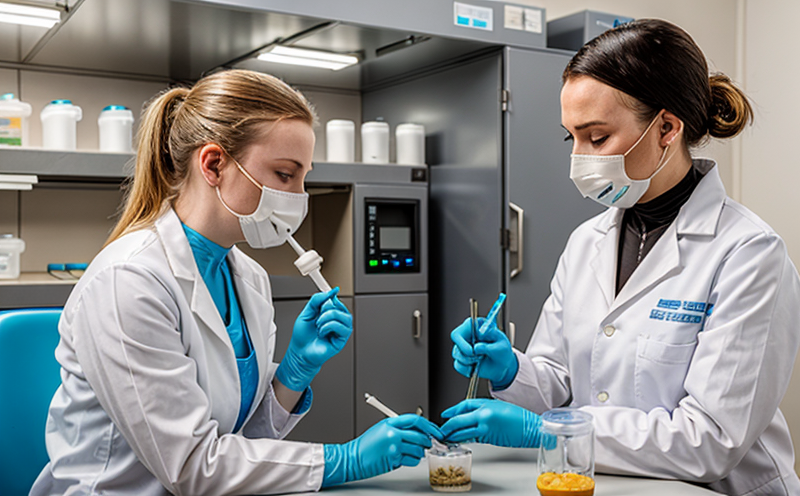USP Multi-Mycotoxin Testing in Animal-Origin Foods
The United States Pharmacopeia (USP) [1] Chapter , titled "Animal-Origin Foods Containing Mycotoxins," is a critical standard for ensuring the safety and quality of animal-origin foods. This test evaluates multiple mycotoxins, including aflatoxin B1, aflatoxin M1, zearalenone, and others, which can contaminate food products derived from animals like poultry, pork, beef, and dairy.
The significance of this test lies in its ability to detect potentially harmful substances that could pose a risk to human health. Mycotoxins are naturally occurring toxins produced by fungi on agricultural crops and raw materials used in animal feed. Contamination can occur through various means such as mold growth during harvesting, storage, or processing.
Animal-origin foods, particularly dairy products, meat, and eggs, have a higher risk of containing these mycotoxins due to the use of contaminated feeds. The presence of even trace amounts of certain mycotoxins can lead to serious health issues such as liver damage, reproductive disorders, and immune system suppression in livestock.
USP specifies a multi-mycotoxin testing protocol that ensures compliance with international standards like ISO 17025 for laboratory proficiency. This standardization is crucial because it guarantees consistent results across different laboratories worldwide. By adhering to this protocol, food producers and processors can ensure the safety of their products before they reach consumers.
The test involves several steps:
- Sample collection from various stages in the supply chain
- Preparation of samples for analysis, which may include extraction methods
- Instrumentation using advanced analytical techniques such as liquid chromatography-tandem mass spectrometry (LC-MS/MS)
The LC-MS/MS method provides high sensitivity and selectivity necessary for detecting minute amounts of mycotoxins in complex matrices. This ensures that even low levels of contamination are identified, allowing for prompt corrective actions to be taken.
Accurate testing is essential not only for regulatory compliance but also for maintaining consumer confidence. Many countries have set maximum allowable limits (MLAs) for specific mycotoxins in animal-origin foods based on WHO and FAO guidelines. For instance, the EU has established strict regulations regarding aflatoxin B1 and zearalenone.
By conducting USP testing, food companies can demonstrate their commitment to quality control and safety standards. This not only helps in avoiding potential recalls but also enhances brand reputation among health-conscious consumers who prioritize product safety.
Why It Matters
The importance of USP multi-mycotoxin testing cannot be overstated. Mycotoxins are potent toxins that can cause severe health problems in humans and animals alike. They are formed during the growth, harvest, storage, or processing of agricultural products. Once ingested by livestock, these contaminants can accumulate in their tissues, leading to various health issues.
For instance, aflatoxin B1, one of the most potent carcinogens known, has been linked to liver cancer and other diseases. Similarly, zearalenone is associated with reproductive disorders in both animals and humans. Ensuring that animal-origin foods do not contain excessive amounts of these toxins is vital for protecting public health.
Compliance with USP standards also helps food manufacturers navigate complex regulatory environments more effectively. Regulatory bodies like the FDA, EMA, and others often reference international standards when setting their own guidelines. By adhering to USP specifications, companies can streamline their compliance processes and avoid costly penalties or product withdrawals.
Furthermore, conducting thorough mycotoxin testing instills trust in consumers about the safety of food products. In an era where transparency is key, demonstrating adherence to rigorous testing protocols signals a commitment to excellence in quality assurance. This can significantly enhance brand loyalty and market competitiveness.
Why Choose This Test
Selecting USP multi-mycotoxin testing for animal-origin foods is advantageous due to its comprehensive approach towards mycotoxin detection. Unlike single-myco toxin tests, this service evaluates multiple types of toxins simultaneously, providing a more holistic view of potential risks.
The test offers several key benefits:
- Comprehensive evaluation covering aflatoxins (B1, M1), zearalenone, and other relevant mycotoxins.
- Precision in identifying even trace amounts of toxins using advanced LC-MS/MS technology.
- Adherence to internationally recognized standards like ISO 17025 for laboratory proficiency.
- Supports regulatory compliance with stringent international and national regulations.
Incorporating this testing into your quality assurance program ensures that you are meeting the highest industry standards. It provides peace of mind knowing that every batch of animal-origin food undergoes rigorous scrutiny before being released to market. This proactive approach can help prevent costly errors and maintain a positive reputation.
Quality and Reliability Assurance
The reliability and accuracy of USP multi-mycotoxin testing are paramount for maintaining high-quality standards in animal-origin foods. Our laboratory adheres to strict ISO 17025 accreditation, ensuring that all tests meet stringent quality control criteria.
We employ experienced scientists who utilize state-of-the-art equipment such as LC-MS/MS systems to ensure precise measurements. The use of this technology minimizes the risk of false positives or negatives, providing consistent and reproducible results across different batches and samples.
Our commitment to quality is further reinforced through continuous training for our staff and regular calibration of instruments. This ensures that every test conducted aligns with international standards and meets the expectations set by regulatory bodies.
In addition, we maintain robust data management practices to ensure transparency and traceability throughout the testing process. All records are meticulously documented and stored securely, allowing for easy retrieval when needed. This comprehensive approach guarantees that our clients receive reliable test results they can trust.





